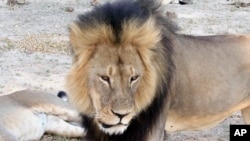The U.S. Fish and Wildlife Service said Thursday that it had opened a probe into the killing this month of a beloved Zimbabwean lion, as the American dentist accused of the killing remained in hiding amid global disdain for the slaying.
In a Twitter post, the service said it had been unable to reach the dentist, Walter Palmer of Eden Prairie, Minnesota. The agency urged Palmer or his representative to contact U.S. officials immediately.
It also called the killing of the lion, Cecil, tragic and said it would "go where the facts lead" in its investigation.
A source close to the case told the Reuters news service that the Fish and Wildlife Service was investigating the killing under the Lacey Act, a U.S. law that bars the trading of wildlife that has been illegally killed, transported or sold. The investigation is focused on whether Palmer was involved in a conspiracy to violate the law, according to the source.
Meanwhile, the White House said it would review a public petition to extradite Palmer. Spokesman Josh Earnest said the petition had exceeded the required 100,000 signatures. He noted it would be up to the Justice Department to respond to an extradition order.
"Sounds as though this particular petition has reached [the required] threshold, and so there will be a forthcoming White House response," Earnest said.
The Safari Club International, an international hunting organization that Palmer belonged to, said it supported a probe into the killing and had suspended the memberships of Palmer and his guide in Zimbabwe, Theo Bronkhorst.
Bronkhorst is facing criminal charges in Zimbabwe for the killing of Cecil, who was drawn away from Huange National Park in Zimbabwe and initially shot by Palmer with a bow and arrow, before he and Bronkhorst tracked Cecil down and shot him dead with a gun.
Palmer has said he believes the hunt was legal. He told the Minneapolis Star Tribune this week that he “had no idea the lion I took was a known, local favorite” and that he may have been misled by hunting guides.
This is not the first time Palmer has been in trouble for hunting. According to U.S. court records, he pleaded guilty of making false statements to the U.S. Fish and Wildlife Service about his fatal shooting of a black bear in Wisconsin in 2006.






